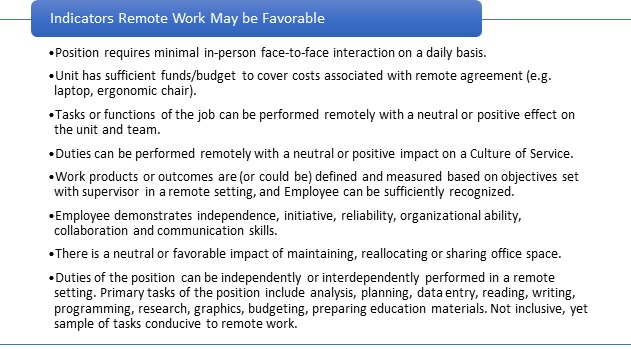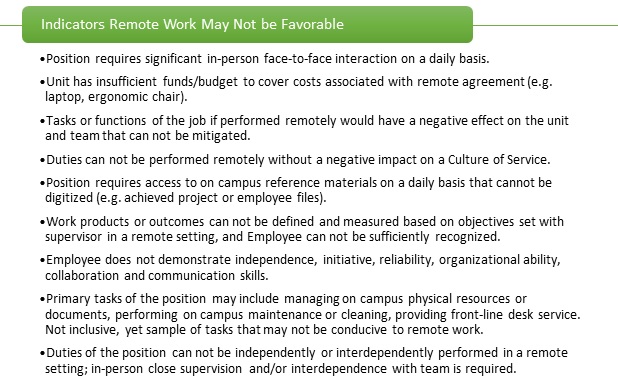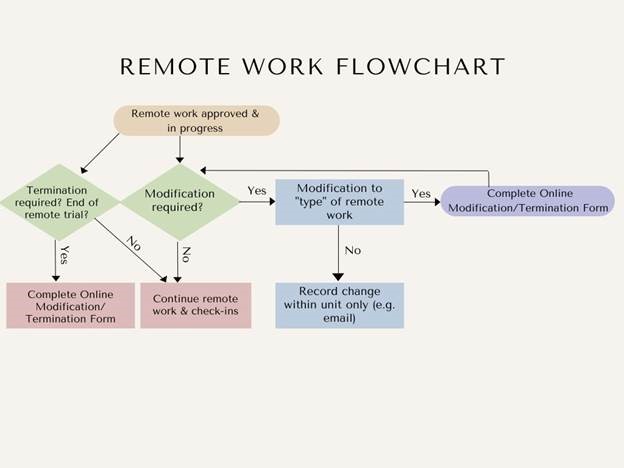Remote Work Arrangements FAQs
Please click on the below to access questions and answers on each subject.
Suitability for remote work is determined through a collaborative process. Review the “Considerations before initiating remote work arrangement” section within the Guidelines for Remote Work to help with this assessment. These guidelines are built to allow for flexibility in recognizing one size does not fit all and, ultimately, unit heads and supervisors are responsible for approving or declining individuals for remote work. As an additional tool, below are some indicators that remote work may be favorable.

Suitability for remote work is determined through a collaborative process. Review the “Considerations before initiating remote work arrangement” section within the Guidelines for Remote Work to help with this assessment. If an employee cannot reasonably perform their role in a remote setting due to the operational characteristics of the unit or group or the nature of the work performed, they would not be a suitable candidate for a RWA or ad hoc work (e.g. an employee whose duties primarily involve managing on-campus physical resources or records, performing maintenance on campus, providing front-line service, etc. is unlikely to be in a position suitable for a RWA or ad hoc remote work). Ad hoc remote work is remote work on a rare and occasional basis and is not intenteded to be a substitute for a formal RWA. As an additional tool, below are some indicators that remote work may not be favourable.

The unit head is the final approver as defined in the Remote Work Guidelines. The unit head may choose to designate someone else as the signing authority. Check with your supervisor to confirm the applicable signing authority for your application.
Note that the application form allows for multiple email addresses to be inserted into the signing authority space on the application. The supervisor may request to be added in addition to the signing authority (unit head or designate) to have access to view the details of the request. Yet ONLY the signing authority (unit head or designate) should click “approve” or “reject” on the application. Once approve is selected, the employee will be notified their application has been approved.
The Guidelines for Remote Work Arrangements are in place until Dec.31, 2024. Therefore, the arrangement will be to a maximum of Dec.31, 2024. An evaluation will determine what remote work will look like following this period.
All requests for accommodation follow the Workplace Accommodation Policy.
It is essential that supervisors work with individual employees and consider the whole team objectively when evaluating RWAs. When possible, supervisors should consider a group of proposals together with the unit head, which ensures a process that is consistent and transparent. The Flexible Work Arrangement Workforce Summary and Planning Tool is available as a supporting document. Units/supervisors may also wish to proactively explore which positions may be suitable for remote work in anticipation of requests.
Ad hoc remote work situations are not intended to be a planned regular occurrence. If it is expected that you will be looking to engage in remote work on a regular basis (e.g. one day per month) or if it happens that you are making multiple ad hoc remote work requests, a hybrid RWA is to be explored with your supervisor. If it is sporadic rather than on a schedule, this would be a non-scheduled based hybrid RWA. Supervisors are expected to manage any recurrent requests and advise the employee to complete a RWA request as applicable. Supervisors in consultation with their unit head are then responsible for determining whether ad hoc remote work is possible for an employee.
No, at this time a RWA application form and supporting forms are not required. The request and approval are documented by writing in an email between the supervisor and employee for each occasion. While at this time forms are not required for ad hoc remote work, employees and supervisors are asked to review the guidelines and forms to ensure risks are appropriately and reasonably mitigated. Ad hoc remote work is not intended to be a substitute for a formal RWA and should not be recurring or frequent (e.g. occurring 1-3 times monthly). Supervisors are expected to manage any recurrent requests and advise the employee to complete a RWA request as applicable. Memorial will be reviewing ad hoc remote work as part of the ongoing feedback and review of the guidelines.
Please connect with your supervisor to discuss the details of your desired arrangement before submitting an application. The RWA Application and supporting forms (OHS Checklist, Ergonomics Forms, Confidentiality Agreement) can be found via the my.mun.ca portal by clicking the “Employees” tab, then navigating to the “HR Employee Forms” which has a category for Remote Work.
Staffing changes may result in the need to temporarily alter an employee's RWA. The employee will be given as much advance notice, where possible at least two calendar days in advance, of a work activity requiring the employee to attend in person if they are otherwise scheduled to work remotely. This includes temporarily altering a remote work schedule until staffing levels resume to a level where a RWA can continue.
Yes, for requests and the application form see Procedure for Flexible Work Arrangements.
No, mileage reimbursement will not be considered for those who have entered a RWA.
Employees shall notify their supervisor when unable to perform work assignments due to equipment failure or other unforseen circumstances. Employees should contact their internet service provider promptly for support.
No, if you are unwell and feel unable to perform your work, the Leave Administration Policy would apply.
Sensitive paper records could include records containing “personal” information of students/staff/faculty or external third parties. Personal information as defined by the ATIPPA, 2015, includes the following:
- An individual’s name, address or telephone number
- An individual’s race, national or ethnic origin, colour, or religious or political beliefs or associations
- An identifying number (like a student or employee number) symbol or other particular assigned to an individual
- Blood type or inheritable characteristics
- Information about the individual’s health care status or history, including a physical or mental disability
- Information about the individual’s educational, financial, criminal or employment status or history
- The opinions of a person about the individual
- The individual’s personal views or opinions, except where they are about someone else
There are, of course, other types of sensitive information that may arise in paper records including policy advice or recommendations, legal advice, law enforcement matters, confidential evaluations, information from a workplace investigation, financial or economic information, negotiations, labour relations information and third party business information.
Decisions regarding parking permits are up to an individual’s discretion and each person needs to consider their circumstances to decide whether or not to keep a permit. For either complete or hybrid remote work, a worker can continue to keep their permit.
For hybrid workers, it may be more cost effective if the worker keeps their permit rather than pay-per-use. No price adjustments or prorated use will be applied if a permit is kept.
Fully remote workers who only come to campus periodically have the option to return their permit to the parking office and use pay-per use parking at a rate of $1.50 per hour. It is important to note when deciding to give up a permit that the remote work guidelines are currently in place for one year while further considerations of a permanent policy is underway. An agreement may also have to be modified or terminated and if the worker is looking to get a parking permit again after cancelling, there is no guarantee a worker would get the same parking area as before.
If it is decided that an employee is suitable for a RWA and agreement is granted, there are ways to facilitate the working arrangement (e.g. communication to ensure that students, faculty and other team members know how to contact an individual on a RWA and that the individual is readily available via applicable technology such as Skype, WebEx). The RWA is also recommended to be organized on a scheduled basis, particularly when the remote work days are frequent, to allow there to be on campus presence scheduled and for individuals to know where team members are located on a regular basis (e.g. through a shared calendar with the unit).
Dial 864-3700, enter your four-digit phone extension, followed by #. Enter your voicemail PIN/password, followed by #.
You can also set up your voicemail to be sent directly to your email. Email ITS Service Desk at help@mun.ca with your Someone from your unit who normally makes VoIP phone requests will have to approve. Grenfell Campus employees can visit Grenfell Campus ITS Remote Support webpage and MI employees contact helpdesk@mi.mun.ca.
Tools such as a shared calendar with live updates on all team members’ status (e.g. working remotely, annual leave) can help to ensure all team members are aware of who is expected to be on campus and who can be contacted remotely. Tools such as Skype can also help colleagues stay in close contact. Connect with your supervisor to discuss ways to ensure required communication and information is available.
Some employees may already have up-to-date Emergency First Aid training and first aid products. Otherwise, first aid training and first aid kits will be supplied by the university.
Memorial will provide applicable required ergonomic equipment for the primary workspace, yet it will be a financial cost to the unit for any additional supports required for the secondary workspace. To manage costs, some units have found solutions such as purchasing a bank of ergonomic chairs on campus which can be used on a rotational basis for those who require this and are on a scheduled hybrid RWA. Certain equipment (e.g. keyboard, mouse) may also be transferred between work locations on a regular basis.
Provided the Request for an Ergonomic Assessment has been submitted and the employee is reasonably available to schedule this assessment with the ergonomist, at the discretion of the employee and supervisor, the RWA can begin while awaiting the assessment and any necessary equipment. However, if part of a return to work or accommodation case, arrangements may need to be in place prior to any applicable remote work.
The Department of Human Resources – Ergonomics offers manual handling training for anyone who needs it. This can be offered virtually or if the department wants to arrange in-person training with a group this can be offered as well.
Employees are required to maintain safe conditions in the remote work area (see Occupational Health and Safety Checklist – Remote/Home Based Work uin the HR Employee Forms section of the my.mun.ca portal). Any work related incidents or injuries should be reported in the standard manner, beginning with reporting to Environmental Health and Safety within 24 hours of occurrence.
Before signing up for First Aid training, ensure you have approval to work remotely and that the time scheduled to conduct the training is approved by your supervisor. Individuals can sign up for First Aid Training through one of the approved first aid training providers. Departments may also contact one of the approved first aid training providers to explore scheduling training for their employees in a group setting. Health and Safety is also exploring group training opportunities on campus for all interested employees and further details will be provided as they become available.
Before signing up for First Aid training, ensure you have approval to work remotely and that the time scheduled to conduct the training is approved by your supervisor. Individuals or departments can pay for the training and can send invoices to health.safety@mun.ca for reimbursement.
No, it is not required at this time. Ad hoc is very infrequent and not to be occurring on a regular basis.
Health and Safety training is recorded as regular hours of work if occurring during regular working hours, no leave code is required.
There is no formal appeal process. Speak with your supervisor to discuss the details around the request and decision that has been made. It is possible there may be an alternate schedule, trial period or type of RWA that can be explored. Not all requests and positions will be able to be supported in a RWA.
RWAs are handled on a case-by-case basis. Since every job, employee and situation is different it cannot be assumed that the same decision is appropriate across positions, units or campuses.
An established RWA exists between the employee and supervisor within their respective unit. An employee who transfers to another unit would need to go through the remote work approval process in their new unit.

Yes, a Memorial-managed device with VPN is required for a remote work arrangement.
No, a Memorial-managed device with VPN is required for a remote work arrangement.
The use of personal devices is not recommended for university work but there may be rare situations where it is beneficial for an employee to work remotely using a personal device. In this scenario, employees will be unable to access systems where access is restricted to the Memorial network. When using a personal device, users should never store or access confidential or sensitive work-related information. Email and Webex are available outside the Memorial network and can be accessed from a personal device.
Laptops are more portable than desktops and therefore offer more flexibility if units are considering remote work arrangements.
No, it is not recommended. Having members of the university community leaving messages on home/personal voicemail is not appropriate from a confidentiality/privacy perspective. If an employee is heavily dependent on a phone to complete their job duties, the unit should provide a phone to the employee.
To provide feedback, please connect with your supervisor. The Department of Human Resources/Office of the Chief Risk Officer/Office of the Chief Information Officer will also be gathering feedback on these guidelines throughout the year.
